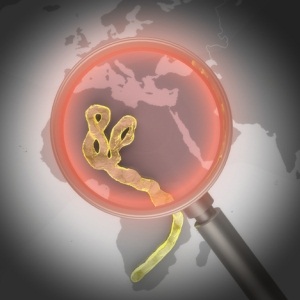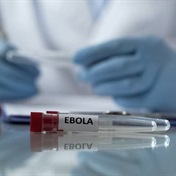
The American strategy on Ebola is two-pronged: Step up desperately needed aid to West Africa and, in an unusual step, train U.S. doctors and nurses for volunteer duty in the outbreak zone. At home, the goal is to speed up medical research and put hospitals on alert should an infected traveller arrive.
Amid criticism that the world still is not acting fast enough against the surging Ebola epidemic, President Barack Obama travels Tuesday to the Centres for Disease Control and Prevention to discuss the outbreak with health officials who've been there.
Also Tuesday, a Senate hearing will examine the U.S. response. An American missionary doctor who survived the disease is scheduled to testify.
The administration hasn't said how big a role the military ultimately will play — and it's not clear how quickly additional promised help will arrive in West Africa.
Read: Cuba sending hundreds of doctors to fight Ebola
The U.S. can do more
"This is also not everything we can and should be doing," Democratic Sen. Chris Coons, who chairs a Foreign Relations subcommittee that oversees African issues, told the Senate last week.
He called for expanded military efforts and for Obama to appoint someone to coordinate the entire government's Ebola response.
"I've heard from organizations that have worked to transport donated supplies and can fill cargo plane after cargo plane but are having difficulty getting it all to West Africa," Coons added, urging government assistance.
White House press secretary Josh Earnest said Monday that the U.S. "responded pretty aggressively" when the outbreak first was reported and "since that time, our assistance has steadily been ramping up."
Supplies aren't the greatest need: "Trained health professionals for these Ebola treatment units is a critical shortage," said CDC's Dr. Steve Monroe.
Read: Wealthy countries must help halt Ebola
CDC trains volunteer health workers
Aiming to spur them, the CDC is beginning to train volunteer health workers headed for West Africa on how to stay safe, Monroe said. CDC sent its own staff to learn from Doctors Without Borders, which has the most experience in Ebola outbreaks. CDC will offer the course at a facility in Anniston, Alabama, for the next few months, teaching infection-control and self-protection and letting volunteers — expected to be mostly from non-government aid groups — practice patient triage.
"It's gone beyond an Ebola crisis to a humanitarian crisis. It does require more of a U.S. government-wide response, more than just CDC," Monroe said.
Read: What Ebola workers go through to stay safe
Here are some questions and answers about that response:
1. What is the U.S. contributing?
The U.S. government has spent more than $100 million so far, said Ned Price of the National Security Council. Last week, the U.S. Agency for International Development announced it would spend up to $75 million more to provide 1,000 treatment beds in Liberia, the worst-hit country, and 130,000 protective suits for health workers.
The Obama administration has asked Congress for another $88 million to send additional supplies and public health experts, and to develop potential Ebola medications and vaccines.
Also, the State Department has signed a six-month contract, estimated at up to $4.9 million, for a Georgia-based air ambulance to be on call to evacuate any Ebola-infected government employees, and other U.S. aid workers when possible.
"The ability to evacuate patients infected with the Ebola virus is a critical capability," said Dr. William Walters, the State Department's director of operational medicine.
2. Beyond delivering supplies, what's happening on the ground?
The CDC currently has 103 staffers in West Africa working on outbreak control and plans to send about 50 more. They help to track contacts of Ebola patients, train local health workers in infection control and help airport authorities screen whether anyone at high risk of Ebola is attempting to leave.
Two of the CDC workers are in Ivory Coast to try to stay ahead of the virus, helping health authorities prepare in case an Ebola patient crosses the border into that country.
3. What are the U.S. military's plans?
A: The Defence Department has provided more than 10,000 Ebola test kits to the region and plans to set up a 25-bed field hospital in the Liberian capital for infected health care workers.
Pentagon spokesman John Kirby suggested Friday that more could be coming.
"The Department of Defence has capabilities that might prove helpful," he said, adding, "We're having those discussions right now."
Read: Britain sends military to fight Ebola
4. Will Ebola come to the U.S?
U.S. health officials are preparing in case an individual traveller arrives unknowingly infected but say they're confident there won't be an outbreak here.
People boarding planes in the outbreak zone are checked for fever, but symptoms can begin up to 21 days after exposure. Ebola isn't contagious until symptoms begin, and it takes close contact with bodily fluids to spread.
Read: American women with Ebola is 'smiling'
5. The U.S. only has four of those isolation units where Ebola-stricken aid workers were treated. Where would sick travellers be treated?
"There's still a perception in the public that the only place these people can be treated is at one of these specialized facilities like the one at Emory or Nebraska, and that's just not the case," Monroe said. "We are confident that any hospital in the U.S. can care for" an Ebola patient.
After all, five U.S. cases of similar haemorrhagic viruses — one Marburg virus, the others Lassa fever — have been treated in the past decade.
The CDC is telling hospitals to ask about travel if someone has suspicious symptoms, to put the person in a private room with a separate bathroom while asking CDC about testing, and to wear a gown, mask and eye protection when delivering care.
"This virus is completely inactivated by all the normal disinfectants used in a hospital setting," Monroe noted.
Read more:
Ebola 'overwhelming' health services in west Africa
West Africa faces famine due to Ebola outbreak
Japanese researchers develop 30 minute Ebola test
Image: Geographic map with Ebola virus from Shutterstock
See breaking news and the hottest health tips before anybody else by joining South Africa’s biggest and best health community, like health24 on Facebook now!




 Publications
Publications
 Partners
Partners











